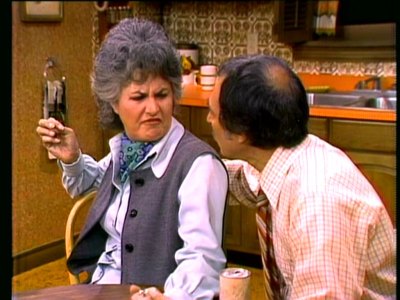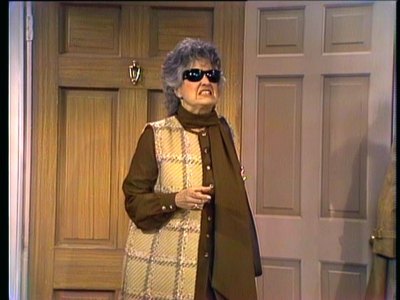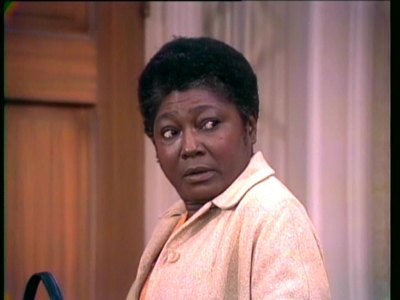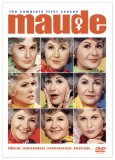| Reviews & Columns |
|
Reviews DVD TV on DVD Blu-ray 4K UHD International DVDs In Theaters Reviews by Studio Video Games Features Collector Series DVDs Easter Egg Database Interviews DVD Talk Radio Feature Articles Columns Anime Talk DVD Savant Horror DVDs The M.O.D. Squad Art House HD Talk Silent DVD
|
DVD Talk Forum |
|
|
| Resources |
|
DVD Price Search Customer Service #'s RCE Info Links |
|
Columns
|
|
|
Maude - The Complete First Season
God will get you for that, Walter.
You have to hand it to Norman Lear. The creator of the most famous right-wing bigot in American pop culture, Archie Bunker in All in the Family, didn't rest on his laurels and stay safe by stamping out a carbon copy spin-off when the overwhelming success of All in the Family demanded a follow-up. No, he proceeded to create a character just as memorable as Archie, an upper-middle class, 47-year-old, four-times married housewife named Maude Findlay from the tony village of Tuckahoe, New York, and in the process, skewered just about every liberal pretension swimming around out there in 1972 America. Now that took guts on Lear's part. The artistic crowd in Hollywood aren't known for poking fun at themselves, particularly when it comes to their beloved politics (which then, as now, were overwhelmingly liberal). Maude could easily have presented its liberal agenda without self-satire (Lear's All in the Family success was so profound that he could have gotten the studio's green light to film the phone book in 1972), but Lear took the brave step of presenting a fully-rounded, ground-breaking character whose ideas and outlooks Lear held dear, but who turned out as flawed (and hysterically funny) as right-wing bigot Archie Bunker.

There had never before been a woman like Maude Findlay on American television prior to 1972 (and I'm not so sure there ever has been since, either). Appearing fully-formed as if from the head of Zeus, Beatrice Arthur's Maude Findlay slammed into American living rooms like a genuine force of nature. It's really quite breathtaking to experience Arthur's Maude, particularly in the context of woman's roles on TV back during the 1970s. Up to 1972, arguably the most famous woman on television must have been Lucille Ball, that brilliant physical comedian whose antics were thoroughly scrubbed of any kind of political or social context (although of course, historians today see contextual undercurrents in her various shows). The point is, no female lead on a television show (and there were damn few of those to start with) prior to Maude concretely, ostensibly stood for something politically or socially identifiable (even Marlo Thomas in That Girl and Mary Tyler Moore in her self-named show, were sitcom stars first, at the service of traditional sitcom stories -- political and sociological considerations were firmly secondary and at best, oblique). That's why Maude's appearance was such a ground-breaking event (as well as an extremely popular event: Maude debuted in 4th place for the year in the Nielsen's, and stayed in the Top Ten for four of its six seasons). Here was a female character who was in no way subordinate to either a male lead in the series, nor was she merely a prop to ground various wacky sitcom antics. Maude's views on everything from male menopause to abortion were the entire focus of, and reason for, the series.
Maude closely followed Lear's structure for All in the Family's episodes: a hot-button topic would be the thematic center of a story that would allow the characters in the show to basically argue their way through their feelings about said topic. Simple. No extraneous plot devices, no complicated set-ups. Just characters, usually confined to the main sets of either the living room, kitchen or bedroom, discussing (and screaming) their way through deeply held convictions (and prejudices) concerning vital social and political issues of the day. And what issues they were, too. All in the Family had already essentially ripped the lid off the censors' Pandora's Box, so few topics were still considered taboo for TV back in 1972. Maude: The Complete First Season covered themes as wide as psychiatry (still seen as a big thing back then), sexual discrimination, male menopause, women "having it all" (you may be shocked to see that Maude doubts women can have it all when it comes to career and family), divorce, drug laws, race relations, the Vietnam War, medical malpractice, and most notoriously, abortion. The first season of Maude caused shockwaves throughout the country when it was announced that a special two-parter would have Maude suddenly pregnant at 47, and not only contemplating an abortion, but actually going through with having one. There was no bigger domestic issue in 1972 (times haven't changed, have they?) than abortion, and hundreds of protests were launched against the new show, including most of the major churches organizing boycotts. Several stations did bow to public response, and refused to carry the show. Seen today, the two-part episode is remarkably fair-minded about Maude's actions, although it does take the easy route, and avoids the messy emotional aftermath of her actions (the episode never actually deals with the abortion, just Maude's decision to have it -- and subsequent episodes this season never mention it). The show doesn't ask you to agree with her decision, but just understand it, which I found dramatically honest -- even though from an intellectual standpoint, the argument is fairly one-side, considering the information put out by Maude's daughter Carole (who's the main instigator for Maude's decision to have the abortion) is slanted heavily towards the pro-choice side. However, it's not an easy decision for Maude to make, and the character does acknowledge that she may very well ultimately regret her actions; it's not a gung-ho endorsement of her decision. And indeed, almost all of Maude's episodes not only don't ask you to agree with Maude, they actively show her up for her liberal pretensions, time and time again.
Nowhere are Maude's liberal prejudices more pronounced - and more hysterically portrayed - than in her views on race relations. Maude's political beliefs, a staunch liberal Democrat who believes in first and foremost, white guilt, are often turned right back on her (just as Archie's right-wing views were in All in the Family) with the aide of her black maid, Florida Evans (the marvelous Esther Rolle, who would get her own spin-off from Maude, called Good Times). Just the notion that Maude, a guilty white liberal and adamant feminist would insist on having a black maid, was a big step towards deflating her self-satisfied image. And Lear and his writers don't shy away from having Florida call Maude on her hypocrisies, and puncture her liberal prejudices time after time. Unlike Lear's All in the Family, where Archie's right-wing attitudes would be thoroughly ganged up on and trounced by Mike, Gloria, and various neighbors and friends, Maude's dynamic is much more balanced. Maude is essentially a hypocrite; she believes in women's and black's rights, but insists on having a black maid to do her housework. She believes the police are fascists, but she also believes that she's essentially above the law when it comes to her own actions. She deplores the fact that she inadvertently became a slum lord, but congratulates Walter when he dumps the problem property on someone else. She believes doctors are a self-protecting group who close ranks when malpractice is involved, but she melts when a nattily dressed doctor pays her a house call, and so on. But Maude's supporting characters kept the arguments on a more even keel. The point of this first season is still to deflate the "limousine liberal" hypocrisies that, to this day, are rarely skewered on TV. But Maude's various flaws and faults are accepted and indeed, celebrated, as part of her complex nature - a rather forgiving view of a bigot that Carroll O'Connor had to fight for years to achieve for his Archie Bunker character, after being portrayed as a one-sided clown the first few seasons.

Facilitating that acceptance of Maude's hypocrisies is Maude's husband, Walter (Bill Macy). Certainly the most forgiving husband in TV history, Walter seems to share Maude's political leanings (the series deliberately leaves this aspect of his character vague this first season, to keep a balance), and he loves her precisely because she's such a mercurial, emotional flip-flopper. Despite what tangent Maude may go off on, which frequently entails a personal attack on Walter, Walter ultimately loves Maude in spite of her faults. As well, Maude's maid, Florida, comes to love Maude, recognizing that despite Maude's misguided attempts to "level the playing field," she's essentially a kind-hearted woman. Maude's divorced daughter, Carol, at least in this season, plays more the role of devil's advocate, throwing out contrary thoughts and feelings to challenge Maude's preconceived notions. It's not a terribly involving part at this point, and it exists basically to instigate Maude's arguments. An interesting addition to the cast of characters is Walter's best friend and next door neighbor, Dr. Arthur Harmon (Conrad Bain). An up-front conservative, Lear avoids, at least for this season, the pitfall of making Arthur an out-and-out buffoon, in order to make an easy villain for Maude to castigate. Bain's Dr. Harmon often gets the better of Maude, throwing off sardonic witticisms that Maude matches, but which don't eliminate what Arthur said. Most importantly, he's not cast as an opponent of Maude's; even though Maude often views him that way. Arthur is a friend of both Maude's and Walter's (we find out he was the friend that first introduced them), and despite his disagreements with her, treats her affectionately. It's another indication of the remarkably even-handed comedy of this first season of Maude.
But let's not forget, in all this talk about politics and controversy, that Maude is one of the funniest shows of the 1970s -- I mean laugh out loud funny -- and much of that load can be laid squarely on the broad, manly shoulders of Beatrice Arthur. I can't accurately describe the crushingly funny, dead-pan line readings of Arthur's marvelously alive Maude, but I can tell you that Beatrice Arthur's performance here immediately ranks her right up there with the all-time TV greats, including Gleason, Silvers, Ball, O'Connor and Benny. That's not an overstatement. There's true genius in her startlingly original creation of Maude; there just simply wasn't any woman even remotely like Maude on television, until Arthur created her. Needy, waspish, a blowhard, floridly theatrical, cutting, bullheaded, hyper-emotional, fragile yet iron-willed, defensive, offensive, vain, deeply sexual, possessive, and above all, truly bone-deep funny in her line delivery, Arthur's Maude is at least the equal of O'Connor's Archie Bunker, and a groundbreaking icon in the world of TV women.
Arthur, who evidently had no trouble with the writers frequently making fun of her occasionally mannish manner (a frequent joke would have Maude answer the phone, only for the other person on the line to ask if she was Mr. Findlay), is a true feminist comedienne, in the sense that her character is allowed to be just as much of a loudmouth as a man. Feminine demur is not unknown to Maude (especially when Walter yells, "Maude, sit!" for which she immediately obeys), but it's not her main characteristic. Arthur's Maude is a deeply conflicted character that's pulled off by a supremely confident actress - a tough line to walk. So when Arthur lasers in on a victim, her eyes as steely as her great gray mane of hair, and devastates them with a dead-pan quip aided by that great bassoon of a voice, you're watching what only male comedians were allowed to do in TV prior to her arrival. Watching Arthur storm into a room, wearing wraparound Ray-Bans, her hands in her traditional clutching gesture (as if to, in her second favorite expression, "rip your heart out"), sneering "Don't bug me, Carol!" is to know true, sublime comedy.

Here are the 22, one-half hour episodes of the three-disc box set, Maude: The Complete First Season, as described on the slim cases:
DISC ONE:
Maude's Problem
When Maude learns her daughter Carol is seeing a psychiatrist, she's determined to find out why her daughter need therapy.
Doctor, Doctor
Maude's grandson Phillip is found behind the garage playing "doctor" with the neighbor's granddaughter, which fuels a debate about sexual freedom.
Maude Meets Florida
Florida Evans of Harlem is hired as the new maid, and Maude is determined to make her feel like an equal. But Florida threatens to quit because Maude won't let her do her job.
Like Mother, Like Daughter
Carol is going out with a much older man whom Maude once dated. But when he calls Carol by her mother's name, Maude thinks he still has feelings for her.
Maude & the Radical
When she hosts a fundraising party for a famous black militant leader and her black guests cancel, Maude finds a substitute: her maid Florida!
The Ticket
Even though Arthur offers to get her speeding ticket fixed, Maude insists on having her day in court to prover her innocence.
Love and Marriage
Frustrated about being a single, divorced mother, Carol proposes to a man she is dating. But Maude is dead set against her daughter's plans for a loveless, practical marriage.
Flashback
During the Nixon-McGovern election results, Maude and husband Walter reminisce about their initial courtship in 1968 when they questioned whether they should marry or live together.
DISC TWO:
Maude's Dilemma (Part 1)
Maude is shocked to find out that she's pregnant. And while best friend Vivian consoles her, Maude still has to break the news to Walter.
Maude's Dilemma (Part 2)
While Maude faces the problem of an unplanned pregnancy at 47, Walter debates whether or not he should have a vasectomy.
Maude's Reunion
Maude gets a visit from her old school chum, a beautiful and successful businesswoman, and wonders if she too could have "had it all."
Grass Story
When they discover that a local youth may serve jail time for possession of marijuana, Maude and a group of middle-aged housewives try to get arrested as a protest.
The Slumlord
It's the talk of the neighborhood when a black man pickets the Findlay household. He lives in a tenement building that Walter and Maude unwittingly invested in.
The Convention
When she accompanies Walter to an appliance convention for the first time, Maude suffers from an identity crisis, believing her life has no purpose.
Walter's 50th Birthday
As if Walter weren't feeling depressed enough on his 50th birthday, Maude invites his childhood friend to his birthday party and he promptly drops dead at Walter's feet.
DISC THREE:
Maude and the Medical Profession
On the eve of their trip to Italy, Maude breaks out in a horrible rash. But when she takes too much medication, she decides to sue her doctor.
Arthur Moves In
After a fire breaks out in his home, Arthur becomes a houseguest of the Findlays during the repair work. Since he is busy every night with Walter, Maude starts to feel left out.
Florida's Problem
When Florida's husband orders her to stop working as a maid now that he has a second job driving a cab, Maude won't let her go.
Walter's Secret
After Carol spots him at a cocktail lounge with a young blonde, Walter has to come up with an alibi quickly unless he wants to face the wrath of Maude!
The Perfect Marriage
Immediately after arriving home from a Jamaican vacation with best friends Vivian and Chuck, Maude and Walter are shocked to discover that their friends are planning to get divorced.
Maude's Night Out
Maude and Walter argue all night about a dinner party that Walter doesn't want to attend because he is jealous of the host who always flirts with Maude.

The DVD:
The Video:
Originally shot on video, Maude: The Complete First Season's full-frame image is about as good looking as it's going to be. Not a particularly "pretty" show, with some really ugly production design, Maude: The Complete First Season still looks better than it did when rerun during syndication.
The Audio:
The Dolby Digital English 2.0 mono soundtrack accurately reflects the original broadcast presentation. There are no subtitles, but your TV's close-captioning option works (which solved a decades-old question I had about the lyrics to Maude's knock-out theme song).
The Extras:
Criminally, there are zero extras on this boxed set of Maude: The Complete First Season. Except for Esther Rolle, all of the principle actors are still alive, and it would have been great to hear them, even if for only one episode commentary. Not a featurette; not even an old promo or bumper. Sony did a real disservice to loyal Maude fans by skipping the extras here.
Final Thoughts:
One of my favorite TV comedies finally comes to DVD, and it's a revelation. Norman Lear's Maude: The Complete First Season gives audiences the flip-side of All in the Family's right-wing prejudices, giving us the definitive "knee-jerk liberal" -- and all the flaws that go along with that stereotype -- in the person of magnificent, hysterically funny Maude Findlay. Beatrice Arthur's performance is nothing short of genius. I highly recommend Maude: The Complete First Season.
Paul Mavis is an internationally published film and television historian, a member of the Online Film Critics Society, and the author of The Espionage Filmography.


|
| Popular Reviews |
| Sponsored Links |
|
|
| Sponsored Links |
|
|
| Release List | Reviews | Shop | Newsletter | Forum | DVD Giveaways | Blu-Ray | Advertise |
|
Copyright 2024 DVDTalk.com All Rights Reserved. Legal Info, Privacy Policy, Terms of Use,
Manage Preferences,
Your Privacy Choices | |||||||














